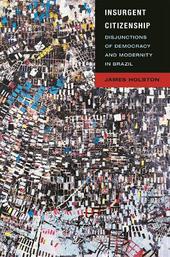
|
Insurgent Citizenship: Disjunctions of Democracy and Modernity in Brazil
Paperback / softback
Main Details
| Title |
Insurgent Citizenship: Disjunctions of Democracy and Modernity in Brazil
|
| Authors and Contributors |
By (author) James Holston
|
| Series | In-Formation |
|---|
| Physical Properties |
| Format:Paperback / softback | | Pages:416 | | Dimensions(mm): Height 235,Width 152 |
|
| ISBN/Barcode |
9780691142906
|
| Classifications | Dewey:307.760981 |
|---|
| Audience | | Tertiary Education (US: College) | | Professional & Vocational | |
|---|
| Illustrations |
11 halftones. 6 line illus. 9 tables.
|
|
Publishing Details |
| Publisher |
Princeton University Press
|
| Imprint |
Princeton University Press
|
| Publication Date |
26 July 2009 |
| Publication Country |
United States
|
Description
Insurgent citizenships have arisen in cities around the world. This book examines the insurgence of democratic citizenship in the urban peripheries of Sao Paulo, Brazil, its entanglement with entrenched systems of inequality, and its contradiction in violence. It argues that contradictory realizations of citizenship characterize all democracies.
Author Biography
James Holston is professor of anthropology at the University of California, Berkeley. He is the author of "The Modernist City" and the editor of "Cities and Citizenship".
ReviewsWinner of the 2009 Best Book on Brazil in English, Brazil Section of the Latin American Studies Association Co-Winner of the 2010 BRASA Roberto Reis Book Prize by the Brazilian Studies Association Winner of the 2009 Leeds Honor Book, Society for Urban, National, and Transnational/Global Anthropology of the American Anthropological Association "Holston's topic in this impressive study on unequal citizenship is the contrast between Brazil's formal, legal equality and the reality that it is a society founded on civic and juridical inequalities."--J.M. Rosenthal, Choice "Insurgent Citizenship will provoke vigorous debate. But Holston has set the terms for such debate with force and intelligence, and his book will surely be an enduring touchstone for scholars of law, social movements, and urban development."--Brodwyn Fischer, American Anthropologist
|